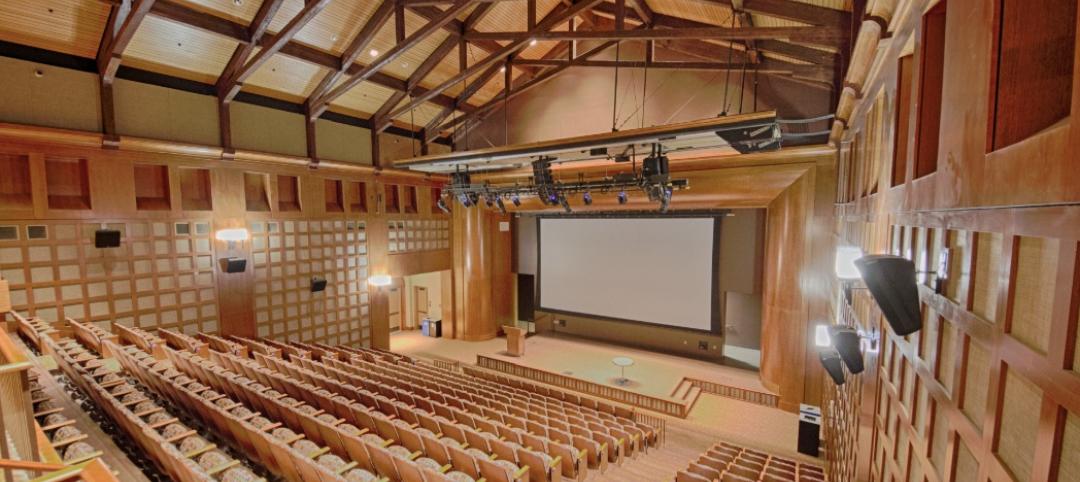
After more than a century without a substantial renovation, Old Suffolk County Courthouse, designed in Neo-Classical style by Boston's first city architect, George Clough, was overdue for a facelift.
 |
| Smothered by decades of coal dust, smoke, and pollutants, the ornate, gilded ceiling of the Great Hall at Boston’s Old Suffolk County Courthouse was carefully restored in a $117 million renovation. The courthouse was renamed John Adams Courthouse following the 43-month project. PHOTO: JONATHAN HILLYER PHOTOGRAPHY |
Enter the makeover team: Boston-based architects Childs, Bertman, Tseckares and general contractors Suffolk Construction/NER Construction Management. Their patient: a courthouse built between 1886 and 1894 and nowhere close to being ADA-compliant, too small to handle the needs of the Massachusetts High Courts, and sporting woefully out-of-date electrical, HVAC, and communications systems.
The team's efforts focused heavily on preservation and restoration because the courthouse was listed on the state and national historic registers, which meant that simple matters had to be addressed in smarter ways. After more than 100 years, its space needs had changed, not only for its judicial function, but also to accommodate security systems and automobile parking. Ordinarily, the solution would have been to loosen the girdle and letting the building expand. But here, the team had to find a way to add square feet within the parameters of the courthouse's original footprint—effectively plumping up the building while still managing to fit it into last season's pants.
To accomplish that goal, the Building Team headed for the light wells. Outdated since the advent of modern lighting systems, parts of the courthouse's two largest wells were converted into 50,000 square feet of usable space for the Massachusetts Supreme Judicial Court and the state Social Law Library.
Meanwhile, new underground parking was inserted into the building's lowest level, giving the state's highest judicial members direct access from their cars to their chambers. The team also moved most major court functions to the second and third floors and reorganized the entry level to celebrate the Great Hall, a soaring four-story public space.
The Great Hall was also a major focus of the team's renovation efforts. Architectural details that were smothered by decades of coal dust, smoke, and pollutants were cleaned inch by inch, as was the decorative ceiling with its intricate, gilded floral abstract pattern bordered by arches and columns decorated with rosettes, egg and dart borders, and classical figures cast in plaster. Damaged areas were infill-painted using reversible materials, saving as much of the original art as possible.
Courtrooms were also heavily renovated. Drop ceilings from the 1960s were removed to reveal original plaster moldings. For the wall and woodwork restoration, the team turned to old photographs that documented original vibrant paint schemes, Victorian stencil work, and light-colored, lustrous wood finish. Modern, efficient versions of historic lamps and lighting fixtures completed the transformation.
When the dust settled and the nipping and tucking was finished, the now-344,285-sf courthouse was so transformed that officials decided it needed a new name. The Old Suffolk County Courthouse was reborn as the John Adams Courthouse.
Related Stories
| Jul 28, 2014
Reconstruction Sector Architecture Firms [2014 Giants 300 Report]
Stantec, HDR, and HOK top Building Design+Construction's 2014 ranking of the largest reconstruction architecture and architecture/engineering firms in the U.S.
| Jul 24, 2014
Glazing options in correctional and detention facilities
Like it or not, the number of incarcerated people in the U.S. continues to rise. With that, increased security in all aspects of these facilities continues to be a priority. This is where security glazing products that allow line of sight for supervisors to observe and still maintain secure separation can play a key role. SPONSORED CONTENT
| Jul 23, 2014
Architecture Billings Index up nearly a point in June
AIA reported the June ABI score was 53.5, up from a mark of 52.6 in May.
| Jul 21, 2014
Economists ponder uneven recovery, weigh benefits of big infrastructure [2014 Giants 300 Report]
According to expert forecasters, multifamily projects, the Panama Canal expansion, and the petroleum industry’s “shale gale” could be saving graces for commercial AEC firms seeking growth opportunities in an economy that’s provided its share of recent disappointments.
| Jul 18, 2014
Contractors warm up to new technologies, invent new management schemes [2014 Giants 300 Report]
“UAV.” “LATISTA.” “CMST.” If BD+C Giants 300 contractors have anything to say about it, these new terms may someday be as well known as “BIM” or “LEED.” Here’s a sampling of what Giant GCs and CMs are doing by way of technological and managerial innovation.
| Jul 18, 2014
Top Construction Management Firms [2014 Giants 300 Report]
Jacobs, Barton Malow, Hill International top Building Design+Construction's 2014 ranking of the largest construction management and project management firms in the United States.
| Jul 18, 2014
Top Contractors [2014 Giants 300 Report]
Turner, Whiting-Turner, Skanska top Building Design+Construction's 2014 ranking of the largest contractors in the United States.
| Jul 18, 2014
Engineering firms look to bolster growth through new services, technology [2014 Giants 300 Report]
Following solid revenue growth in 2013, the majority of U.S.-based engineering and engineering/architecture firms expect more of the same this year, according to BD+C’s 2014 Giants 300 report.
| Jul 18, 2014
Top Engineering/Architecture Firms [2014 Giants 300 Report]
Jacobs, AECOM, Parsons Brinckerhoff top Building Design+Construction's 2014 ranking of the largest engineering/architecture firms in the United States.
| Jul 18, 2014
Top Engineering Firms [2014 Giants 300 Report]
Fluor, Arup, Day & Zimmermann top Building Design+Construction's 2014 ranking of the largest engineering firms in the United States.















